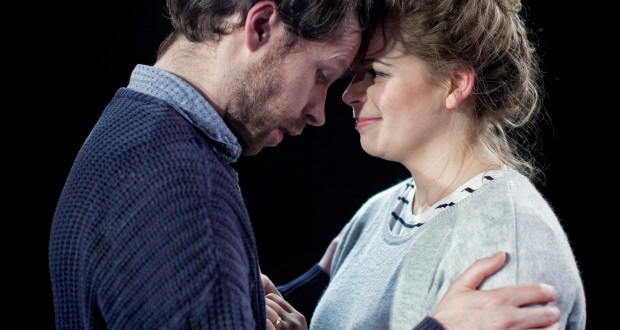Pros: Intimate, emotional: a true-to-life story of a family reeling from personal tragedy.
Cons: Difficulty hearing one of the actors; slight confusion with juxtaposing timeframes. In a single hour I laughed and shed a tear and really felt a part of the family’s drama. It truly feels like it is a story told from the heart.
Summary
Rating
Excellent
The story begins with Charlie Donnelly (Alastair Kirton) speaking with a nurse in somewhat garbled fashion about cleaning headstones, and for the first five minutes I believed he was the character with the disease. However, it became clear that he was the grieving party, deeply traumatized by his wife Amy’s (Katharine Moraz) death. The rest of the play jumps between time periods, from the first signs of the disease to the devastating diagnosis. There are perspectives from their teenage son Matthew (Jamie Scott-Smith), aunt, their literary agent (a nice comic turn by William De Coverly) and the nurse specialist. Due to the sombre nature of the topic there were moments of necessary humour for balance. I laughed heartily at the scene involving a party and accidental class A drug ingestion. The script here really shone, with plenty of sarcasm, in-jokes and talking over one another. The relationship of Amy and Charlie was made all the more real by their wit and intellectual sparring. In turn, seeing Amy in a following scene unable to recognize Charlie at all, is all the more tragic.
One of my favorite lines from the play has to be from the aunt, that those left behind must be a “living tribute” to what is gone. For me that set the tone of the whole piece. My heart strings were also plucked during the scene where their son writes his mother a song and plays it to her.
The set design in the space of the King’s Head Theatre involved two chairs and netting above their heads holding scrunched up paper. This represented in my mind both the books that Amy would never be able to write, and her lost memories. Only upon reflection did I realize there was so little on stage, as the family story was more than enough to fill it. By the end of the play I felt the characters of Amy and Charlie were well fleshed out, and the final scene – when they first met – poignant and bittersweet.
My only criticism would be that I occasionally found it difficult to follow the time frames, particularly when it was not the couple on stage. In a way it reflected the disease itself, the observation of broken parts of memories, not entirely fully realised. I also had some difficulty hearing the voice of one of the actors, despite the small space.
Author: RJ Wilkinson
Director: David Macintosh Loumgair
Associate Director: Elizabeth Kent
Producer: Jessica Cheetham
Booking Until: This show has now completed its run.
 Everything Theatre Reviews, interviews and news for theatre lovers, London and beyond
Everything Theatre Reviews, interviews and news for theatre lovers, London and beyond



